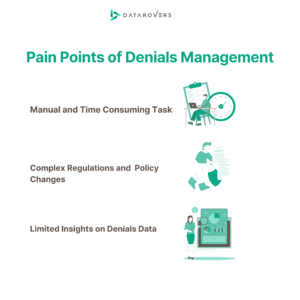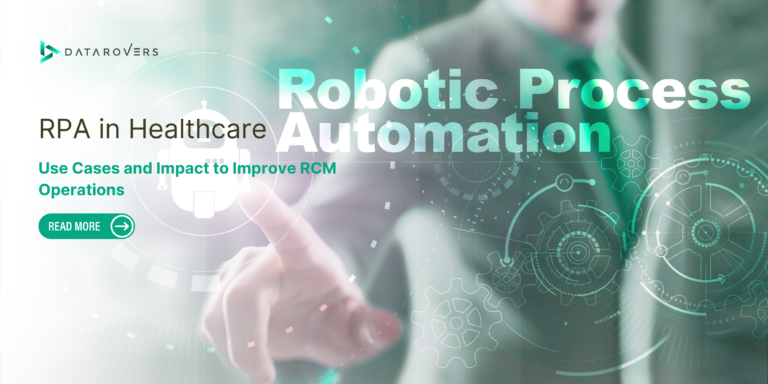Claim denials in healthcare are becoming a critical issue for healthcare providers. Providers deliver patient care and expect timely reimbursements in return but when these claims get denied, they not only get frustrated but suffer financial losses, operational hurdles and strained relationships with payers. AMA reported that nearly 15% of claims submitted to private payers face initial rejection, even with prior authorization. This report highlights the urgent need for tools and solutions to address these drawbacks. So what is the solution? Experts say that AI-advanced tools can streamline denial management and restore balance to the revenue cycle. As Healthcare IT News reported, the Community Medical Centers of Fresno implemented AI in denial management and in the initial six months, they saw a 22% decrease in 197 denials and an 18% decrease in 109 denials.
Today, we will discuss a standout product, Denials360 that has the potential to turn claim denial revenue loss issues into revenue opportunities.
How Claim Denials Impact Revenue in Healthcare
Claim denials are a costly burden for providers. According to TechTarget, a 2024 survey showed that 15% of claims were submitted to private payers for reimbursement and they were initially denied. Moreover, from these denied claims, a ratio of 3.2% is previously pre-approved through the prior authorization process. These stats show how important is it to address this issue. Healthcare denial management requires AI solutions that can reduce denial rates and recover lost revenue effectively. But, first, we need to understand the root causes that cause revenue loss in healthcare due to claim denials:
Why Denials Happen?

1. Immediate Revenue Loss
Claim denials in healthcare not only impact providers’ cash flow but also affect further services that go unpaid. These unresolved claims make healthcare providers lose revenue and on the other hand, healthcare organizations face the risk of writing off revenue that could have been recovered.
2. Increased Administrative Costs
The denied claims process is labour-intensive and time-consuming. This is because, staff have to review, correct, and resubmit claims. However, they often need to be in the loop and have back-and-forth communications with payers. As a result, there is a delay in revenue recovery and also it increases operational expenses as providers need resources to manage denials.
3. Long-Term Financial Risk
Recurring denials have the potential to recover lost revenue and improve financial health. If healthcare systems adopt technologies like AI and ML, they can streamline denial management, eliminate labour-intensive tasks, reduce costs, and ensure a stronger, more efficient revenue cycle over time.
4. Operational Disruption
When denials happen, staff have to generate reimbursement appeals. Appeals get rejected again and again which causes them to divert their main focus. While the provider’s main focus is patient care with this issue they have to deal with administrative burden. This burden causes inefficiencies in the revenue cycle. However, the strain on workflows makes it harder to achieve consistent revenue collection.
How AI in Healthcare Can Solve Denied Claims And Recover Revenue Loss?
AI in healthcare can help healthcare providers with recovering of lost revenue and streamline the denial management process. Machine learning and predictive analysis are the core elements that address the root issues and solve them to optimize revenue cycle management – RCM. According to studies, when AI is integrated into denial management, there is a potential reduction of up to 30% in denial rates. It is because of AI capabilities that it can identify and correct errors in claims before submission resulting in a lower overall denial ratio compared to manual processes. Let’s see how AI in healthcare can solve denial management and revenue loss in a breakdown version:
1. Improved Coding Accuracy
AI tools in healthcare provide accurate medical coding. It analyzes claims data and identifies potential errors pre-submission. It reduces the chances of coding mistakes that provide no denials means reimbursements are processed faster and with greater accuracy.
2. Real-Time Error Detection
AI provides real-time insights that help in capturing flags of inconsistencies, missing information, or errors in claims as they are being processed. The constant feedback addresses issues before the submission of appeals. As a result, providers get minimized risk of claim rejections and reduced rework efforts.
3. Automated Code and Rule Updates
Compliance is getting challenging as payer requirements and medical coding standards are evolving. However, AI tools in healthcare give the latest updates to ensure claims meet current payer-specific requirements. In return, there is a low risk of denials caused by outdated information.
4. Smart Workflow Automation
AI tools have smart queues that are a targeted approach to prioritize denied claims based on their potential financial impact. This approach helps providers stay focused on high-value claims first. Then, optimize resource allocation and accelerate revenue recovery.
5. Root Cause Analysis and Pattern Recognition
AI uses advanced analytics that help in identifying current trends and recurring causes of denials. AI understands these patterns and helps healthcare organizations implement measures to reduce future denials.
6. Streamlined Appeal Process
AI appeal platforms have underlying technology of generative AI and predictive analytics. These technologies help in creating appeals in seconds. From pre-built templates to instant-written appeal letters, AI can analyze data and automatically generate accurate, payer-aligned appeal letters. However, it can significantly improve the success rate of claim resubmissions which helps providers recover lost revenue efficiently.
7. Enhanced Compliance Management
AI checks claims for compliance with payer rules and regulations. It helps providers avoid non-compliance-related denials. As a result, there are smoother operations and reduced risk of financial penalties or payment delays.
Denials 360 – A Comprehensive AI Solution
Denials360 is an AI-powered denial management tool that helps with revenue cycle processes by reducing claim denials. It prioritizes high-value claims and ensures compliance with payer rules. It is a flagship product of DataRovers. It is a health IT SaaS company that was founded in 2017. The company strives to bring advanced AI solutions to prevent revenue loss and enhance financial health in healthcare. Denials360 leverages machine learning and generative AI which aims to help healthcare providers recover lost revenue efficiently and optimize operations. Moreover, its intelligent automation, predictive capabilities, and real-time analytics streamline the entire process which results in better cash flow, enhanced compliance, and improved RCM performance. Here are some of the key features of Denials360:
1. AI-Powered Smart Queues for Triage
It helps automate claim prioritization related to financial impact, urgency, and denial reason codes. It also makes sure which are high-value claims to address them first for maximized revenue recovery.
2. Predictive Claim Scoring
It forecasts claim approvals and identifies potential underpayments. AI highlights high-risk claims for proactive intervention. It reduces the chance of future denials.
3. Generative AI-Powered Data Visualizations
It provides instant, clear, and actionable insights through AI-generated dashboards. This dashboard helps providers understand denial trends and implement data-driven strategies.
4. Automated Denial Notifications
AI denial management system sends real-time alerts for denied claims which enables immediate action to minimize delays. This tool also ensures a quick solution to denials to prevent revenue loss.
5. Simplified Appeal Management
Apart from denial management, this tool offers auto-filled templates and instant-written appeal letters to streamline the process. It also plays a role in automating documentation retrieval and ensuring compliance.
6. Comprehensive Denial Analysis
AI in denial management systems can break down denial reason codes to identify root causes and patterns. It also provides actionable insights to reduce recurring denial issues.
7. Intelligent Workflow Management
Intelligent automation happens for routine denial management tasks which reduces administrative burden. As a result, it ensures efficient resource allocation and timely claim resolution.
8. Real-Time Compliance Checks
For payers, this AI tool continuously updates payer rules and coding standards to ensure compliance. Moreover, it prevents denials due to outdated or incorrect coding and submission errors.
9. Advanced Reporting and Analytics
In generating detailed reports on denial trends, claim recovery rates, and process improvements, this AI tool empowers providers with the information needed to refine RCM strategies.
10. Seamless Integration with RCM Systems
The major thing that makes this product stand out among many is that it gets easily integrated with existing RCM platforms to enhance workflow efficiency. It provides a unified system for managing claims and denials without disrupting operations.
Final Thoughts
Claim denials are still a challenge in the healthcare industry for providers. It impacts revenue, operational efficiency, and patient care. Studies suggest that 84% of denials can be potentially avoidable by integrating advanced AI-powered solutions. Integrating Denials360 can automate denial management, identify root causes, and streamline workflows. Thus, Denials360 empowers healthcare providers to turn challenges into opportunities by recovering lost revenue. Get started with Denials360 today! Schedule a Free Demo or Get a Custom Quote and see how Denials360 platform can revolutionize your revenue cycle management.
Take Control on Your Claim Denials & Improve Your Cash Flow Today!




